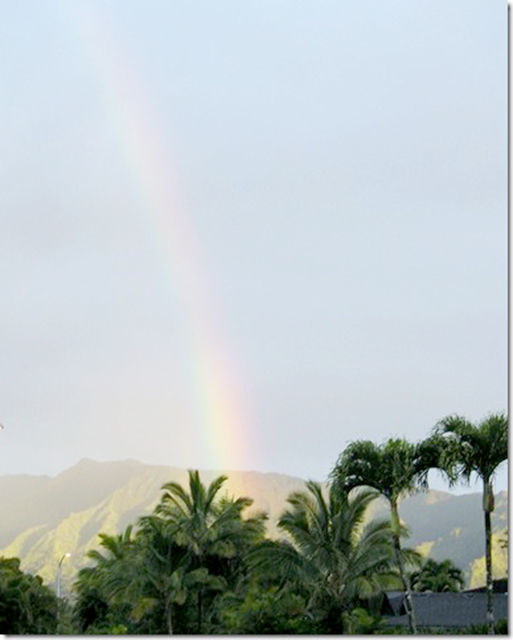“There are a thousand ways to kneel and kiss the earth,” is a Rumi quotation that came back to me recently as I felt a web of connection in the beautiful Lawai setting of the 88 shrines — the Lawai
“There are a thousand ways to kneel and kiss the earth,” is a Rumi quotation that came back to me recently as I felt a web of connection in the beautiful Lawai setting of the 88 shrines — the Lawai International Center. Many people were drawn to the gathering in the tucked-away dell shaded by canopied branches of old trees and tents erected for the day. Visitors and residents of all ages from varied ethnic backgrounds and belief systems thronged on a sweltering Sunday afternoon to take part in the annual occasion, a “Pilgrimage of Compassion.”
Through the laughter and shared enjoyment of this community-centered event and the many activities ranging from the artistic and crafty, taste-centered and acquisition-centered, too (via the silent auction to help raise funds for the non-profit organization), there wove a certain spirit. It was a spirit of sensitivity and depth in a colorful, live poem being written upon the day.
Humility, prayerfulness and haunting beauty — such as Grandmaster Riley Lee’s shakuhachi flute breathed into the air at intervals, and then during the hillside pilgrimage. There was also the excitement of taiko drumming interwoven, like a deep, earth-centered pulse of high emotions of the heart. Members of Taiko Kauai balanced the gentleness of the flute and quiet, introductory messages with the passion and beat of blood pounding through our human hearts.
This takes me back to the poet Jalal al-Din Rumi, whose importance transcended national and ethnic borders. It’s no wonder that his poems written in the 13th century have been translated as a source of inspiration world-wide. It’s also no wonder that after his poems came to the attention of the American public in the 1990s, Rumi’s works gained popularity.
Perhaps the reason for this is because, like that “kneel and kiss” quotation, Rumi’s words can be experienced and played into the world by us in an everyday manner of aloha, with compassion for ourselves, as well as for all other beings. We may vibrate and resonate in our lives in as many different ways as it’s possible to hear in the varied tones and shadings of drums and flutes.
Our heartfelt experiences may come as we work and toil; play and share with our families; exercise, dance and sing, make music; meet and enjoy friends, and reach out to strangers. They may come as we dedicate to deepening knowledge or furthering causes we believe in, such as weeding the forest, protecting endangered plants, birds, fish and other wildlife; preserving cultural information and language; protecting our places of natural beauty from over-development, and our natural resources; serving meals to hungry people; offering “safe harbor” to homeless and the hurt; returning lost valuables intact; doing something practical for a neighbor; listening to someone who needs a caring ear; or just being. There are myriad ways to deepen our compassion and caring in a way that fits each life.
Many readers will already know of what I write. These thoughts, perhaps, will serve as an underlining of a way of life already acquired, if not a reminder. This “Green Flash,” unlike its rarely experienced counterpart in nature, will not set on the present day as it closes. Hopefully, its wink will continue, an ongoing green light, signaling “Go!” like all good news.
How affirming it is to know that our local paper consistently chooses to headline news of forward movement and achievement within the Kauai community, urging citizens with good-news stories to submit them. This positive slant to journalism is rare today, when the focus generally remains on reports of negative, sad and shocking happenings, wars, the disturbing and upsetting behaviors of power-hungry leaders, or the drop-outs of society, a minor segment of our population. These stories are generally used as magnets to sell newspapers and all other news sources.
This is not to advocate for us becoming Pollyannas, or ostriches with heads stuck in the sand in a futile and dangerous avoidance. The idea is to avoid focusing upon negative news and thought because of the matching emotions that flow into the body, as Dr. Andrew Weil advises in “Spontaneous Healing.” Weil prescribes taking a complete news break for any individual who is balancing and healing a mind and body reflecting stress and unwellness.
This past weekend we were transported by violinist Kim McDonough, a talented, young neighbor who is setting her sights on a performance career, playing out her heart at Kapaa Town’s First Saturday. We also enjoyed quite another style of drumming at the Heiva i Kauai festival in Kapaa, joining the throngs that flock to this popular cultural event featuring Tahitian dancers and musicians in demonstrations and competitions. A good-news story I learned relates to one pair in the army of Heiva volunteers, Debra Sue and Corey Mason (of the One World Festival) who “found” Heiva organizer Tepairu Manea — and his co-organizer, wife Keahi Manea — through reading a Hawaiian Airlines magazine feature published some years ago. Once the Masons, from Northern California, connected with the Maneas, they have made Kauai at Heiva time their vacation target since that flash of soulful recognition.
Aloha kakou. Be happy, and be well, Dear Readers …
•••
Dawn Fraser Kawahara, author and poet, regularly instructs on the topics of history and Hawaiian culture for visitors to Kauai through Hawaii Pacific University’s “Road Scholar” program through Pacific Islands Institute. The writer is completing her second memoir, based on her family history in India and Burma. She continues to distribute books through TropicBird Press and perform personalized ceremonies through TropicBird Weddings & Celebrations-Kauai under DAWN Enterprises.


